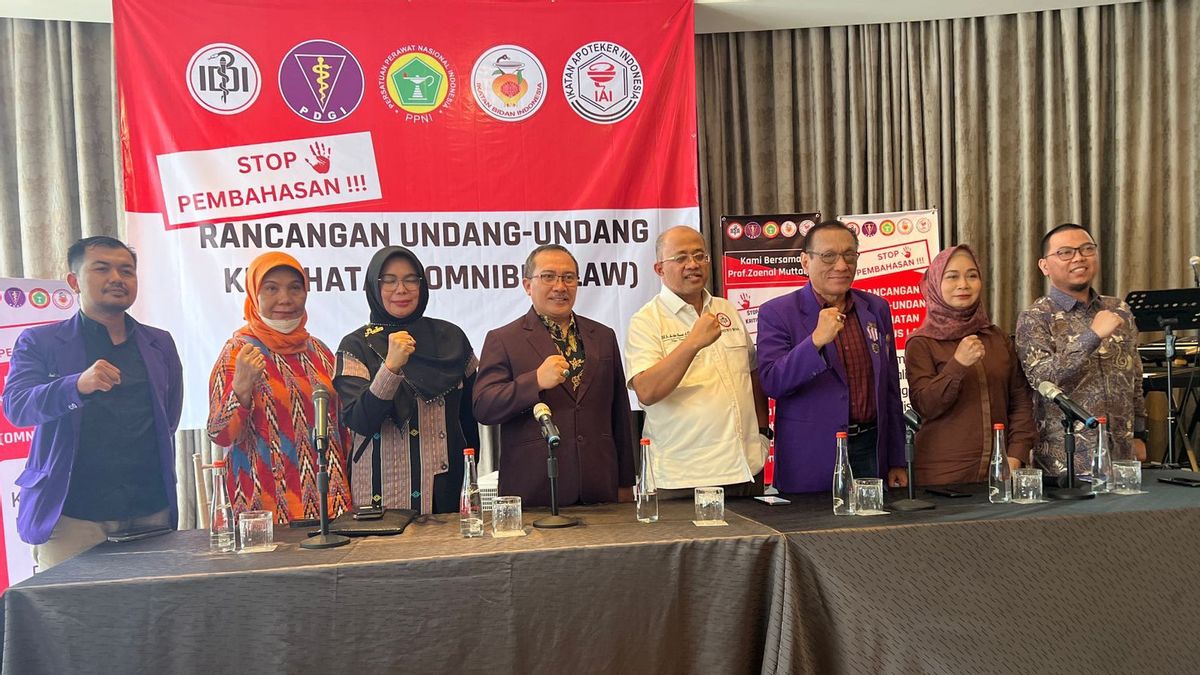JAKARTA - Five professional health worker organizations (nakes) include the Indonesian Doctors Association (IDI), the Indonesian National Nurses Association (PPNI), the Indonesian Midwives Association (IBI), the Indonesian Dental Association (PDGI), and the Indonesian Pharmacists Association (IAI) called for peaceful action with all medical personnel in Indonesia to stop the discussion of the Omnibuslaw Health Draft Law (RUU) by the Government.
"This peaceful action is a form of concern for health professional organizations to see the process of making hasty regulations and not paying attention to input from professional organizations that incidentally are field workers," explained DR dr Moh. Adib Khumaidi, SPOT, General Chairperson of the Indonesian Doctors Association in a press statement received by VOI, March 3.
Despite carrying out peaceful demonstrations, health workers' services to the community are still guaranteed. "We still guarantee that access to health services for the community is still well served," he said.
Through this action, according to Adib, they want to remind the government that there are still many health problems in the field that the government needs to pay attention to. Increasing access to health services, improving the quality of services provided, and utilizing technology are several solutions that can help improve health services in Indonesia.
The government needs to expand access to health services in underserved communities, so far access to health facilities is still lacking by the people in the interior, and medical personnel also have difficulty reaching the population because of infrastructure and limited facilities. Ha-hal like this needs to be considered by the government and people's representatives in parliament rather than continuously making new laws," said DR. Dr. Moh. Adib Khumaidi, SpOT.
Protests and service leave are human rights as stated in the universal UN declaration of human rights. Around the world, peaceful actions and protests were held to criticize human rights abuses, to expressly prioritize the views of organizations or communities on the government or state authorities.
DR. Harif Fadillah, S.Kp., M.Kep, Chair of the Indonesian National Nurses Association (PPNI) highlighted that the health bill has the potential to weaken the protection and legal certainty for nurses/health workers and the community, degrade the health profession in the national health system, have the potential to weaken the role of civil society in the democratic climate in Indonesia by dividing the organization of the profession that oversees member professionalism, and puts more emphasis on foreign health workers. We also urge all members of professional organizations to remain solid in fighting for the interests of the profession and society," said Harif.
These five professional organizations agreed to voice that the government had put too much pressure on the discussion of the Health Bill on medical personnel.
We also criticize the exception of adaptation to doctors who graduated abroad and specialist medical education on a hospital basisd condition where it only needs to be done in accredited hospitals. Whereas so far specialist doctor education has been carried out in hospitals with the highest accreditation. These two things are feared to cause the birth of substandard health workers. If this happens, the only thing that is harmed is not only the profession but the health of the community who is more disadvantaged is the health of the people being served, "said the Head of the Legal and Cooperation Bureau of the Indonesian Dental Doctors Association (PDGI), DR Paulus Januar S., drg, MS, CMC.
These five medical Professional Organizations also reveal that there are quite a lot of medical personnel and health workers with unclear work ties so that there is no guarantee in carrying out their professional work.
The Omnibuslaw Health Bill does not provide legal guarantees regarding the certainty of work and welfare of medical personnel and health workers, and there is also no guarantee of legal protection for health workers. What has been echoed by the government, has never been carried out in the field, in the end, the Professional Organization, which has always been at the forefront of protecting its members. For example, violence against internship doctors that occurred in Lampung recently, and which some time ago happened to Prof. Dr. Zaenal Mutaqqin, PhD, SpBS(K), a neurosurgeon with rare expertise, but because of his critical attitude, his work contract at Karyadi Hospital Semarang was stopped.
"If a professor and consultant specialist with an international reputation can be treated like that, what about weaker positions for health workers. It turns out that the Health Bill does not protect medical personnel and health workers in obtaining certainty in carrying out their professional work," said Dr Mahesa Paranadipa Maikel, MH, Deputy Chair II, PB IDI.
One of the main challenges facing the Indonesian health system is access to care. According to data from the World Health Organization (WHO), only 38 percent of Indonesia's population has access to basic health services. This is partly due to the lack of infrastructure and resources in rural areas, where many Indonesians live. To overcome this problem, there needs to be an expansion of health facilities and services in these areas, as well as increased financing for health.
Many health workers are willing to work in remote places, but cannot work optimally due to the lack of facilities, both health facilities and access to health facilities that are not noticed by the government. Not to mention that there is still no guarantee of the protection and safety of health workers while on duty from the local and central governments," said DR Ade Jubaedah, Secretary General of the Indonesian Midwives Association (IBI).
"There are two things that forced us to carry out an action plan, first the discussion of this bill, which from the beginning was hidden and was very hasty without paying attention to our input from the Medical Health Professional Organization. Second, there are efforts to pit the community against the profession which will greatly harm the health future. The existence of the Health Professional Organization, which has been serving the country, has not received input," said Apt. Dra Tresnawati, Deputy Secretary General of the Indonesian Pharmacists Association.
These five health professional organizations also highlight the importance of better collaboration between various stakeholders in the health sector. These include government agencies, professional organizations, and civil society groups. By working together, all parties can develop an effective strategy to overcome problems in health services in Indonesia.
The English, Chinese, Japanese, Arabic, and French versions are automatically generated by the AI. So there may still be inaccuracies in translating, please always see Indonesian as our main language. (system supported by DigitalSiber.id)













